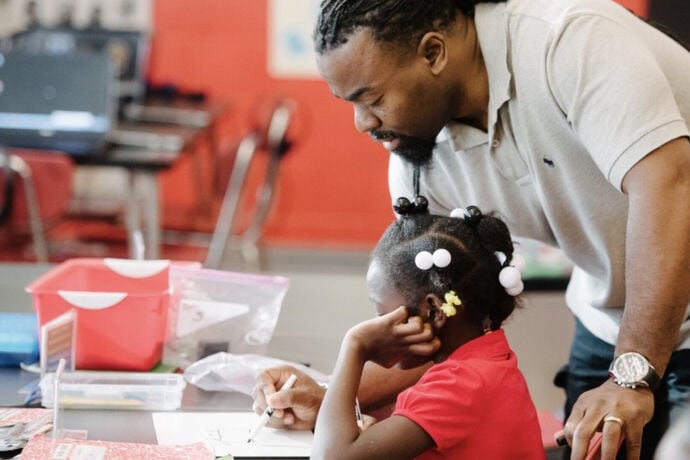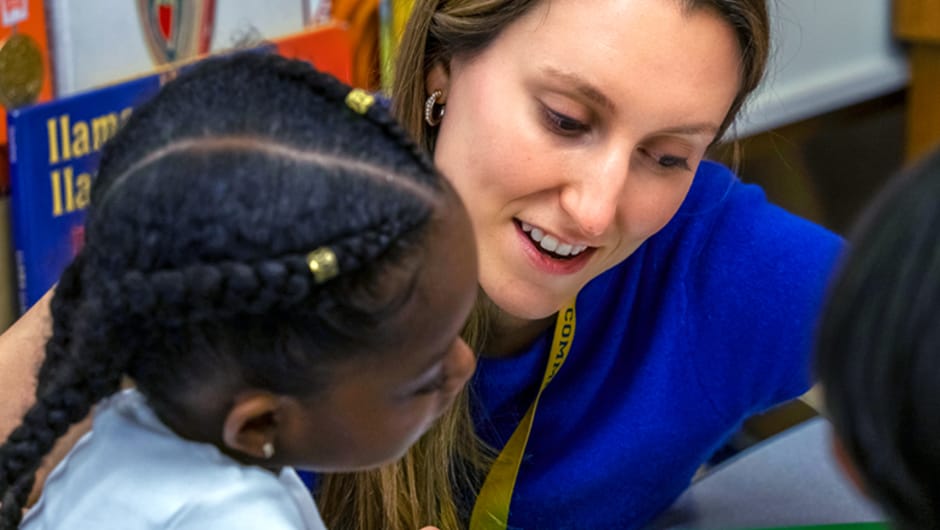
Working With My Hands Is My Self-care
Teachers do more than teach. A longtime educator explains why it’s crucial that they have an outlet for managing stress.
Kenneth Robinson is an anomaly in K–12 education.
For one, he’s a Black man who has been teaching math for 29 years. He has remained at the same school—Hendley Elementary in the southeastern quadrant of Washington, D.C.—for his entire career.
Teaching, Robinson said, is probably the most rewarding thing he has done in his life. But there have always been challenges.
“As a teacher, especially in an urban environment, at any given moment—especially when it's warm—gunshots ring out, we're on the floor, school is on lockdown,” he said. “In my time at Hendley, we've had two bodies at the end of the playground during the school day. And sometimes the kids are the ones who see it before the adults. That is on your shoulders.”
There is also the need to help students resolve some of the struggles they carry to school each day such as hunger and abuse. There are pressures to get students caught up who are performing far below grade level—and to do it by the end of the school year.
“That stress weighs heavy,” said Robinson (D.C. Region, '93). “It weighs so heavy. And if you don’t have some type of self-management, you start having displacement of aggression.”

Without an outlet, it’s easy for a teacher to remain in “school mode” and, for example, raise their voice at their children or not communicate with their partner, Robinson said. “If you don’t have a way to release that stress, it will eat you up.”
That’s why each day, for almost as long as he has been teaching, Robinson starts working out by about 4:30 a.m: lifting weights and punching a heavy bag. He tackles projects in the home he shares with his wife, Angie, who is also a teacher, as well as their two daughters. In his free time, he paints vibrantly colored artwork that he displays in a gallery in his home.
Robinson talked with One Day about the importance of self-care for teachers and why it “feels different” at this moment as an educator—with the ongoing coronavirus pandemic, the struggles of under-resourced urban schools, and the politics and systemic racism that contribute to the burdens of being Black in America.
You have said that teachers do more than teach. Would you expound on that?
Working at Hendley for all these years, I've seen it all. Kids have come to me and they have a major issue at home. You can't be Mr. Robinson the teacher at that point.
The first thing that a really good teacher is, is that friend. You develop that relationship, that trusting relationship. It doesn't take my students more than two weeks to understand that, man, this guy really loves me. He cares about me as a person.
So the hats that you have to put on change constantly. And inside this pandemic, it's a lot of weight. It's a lot of things that we have to do that have absolutely nothing to do with math or reading or the specific curriculum. Sometimes students just need someone they can lean on.
Yeah, it's a heavy load at times. But when you see that sparkle in a kid's eye that they got it—and when I say they got it, it doesn't necessarily have to do with books. They actually made the connection of what you were teaching them, what you were telling them about life.
Why is it important for teachers to have an outlet?
You have to have a way to let some of the stress go. I can let some of it go through my painting because lifting doesn’t always do it.
My doctor has asked me, “Why are you still lifting heavy weights? Who cares if you can bench 350? Why are you doing this?” I tried to explain to him that one, I work in Southeast. So at any given moment, I could have—I say—the father of the week, or the father of the month, or the boyfriend who wants to come up and invade my space because they're not happy with what I said or how I said it. But the other part was, I said, “Doc, this is my way to get rid of my stress.”
You know, I hit my heavy bag. I do these things. And when I sit down with pencils in my hand, I am able to put that anger, pain, and love into a piece of paper.
Would you say more about what your artwork means to you?
My painting, still to this day, has a calming effect if I've had a hard day. And I don't even have to be in school. Being a Black man in the last five years—actually, even when Obama was in office—the stresses of societal issues weigh heavy.
I've been in meetings and I've had some individuals say, “Mr. Robinson, you're so quiet.” I've had presenters who have tried to identify me like I'm not paying attention because I'm quiet. And folks don’t understand. And when I say “these presenters” and “some people that I‘ve worked with,” they've been non-Blacks. They don't understand I'm being quiet because sometimes I have these Black thoughts, and these Black thoughts don't allow me to share. I had thoughts that if I say these things, you're not going to understand them, and you're going to interpret them wrong.
I have Black thoughts that say, when I get into my BMW X5 and a police car gets behind me, or if I'm driving my BMW M3 and a police officer gets behind me—or nobody has to get behind me—I'm still worried and concerned. Is today the day that I crossed the line? And there’s not really a line there, but someone else sees it as I crossed the line. Folks don’t understand that one slip, one mistake can ruin a Black man's life with the snap of a finger.
“If you don’t have a way to release that stress, it will eat you up.”
You have said that teaching at this time feels “different.” What does that mean?
I really feel bad for the kids going to junior high or the kids that were in the sixth grade and are going to be pushed into high school. When you can't do the work, and the funding or the resources or the time just isn't there to help you gain those years that you missed, it's different. It's got to be different. And not all educators are treating it as different.
I fear the future for my kids. I really do. I am working, my teammates are working. It's going to be tough. And I'm not sure that the average school system is equipped to help all that need extra help. So what does that say moving forward for our society? What is that going to look like?
Who are we going to blame in five years, 10 years, 15 years, if people aren't voting or, you know, we don't have jobs? Are we going to turn back and say, “Well, this was the pandemic?” No, we can't just blame it on the pandemic. What did we do to try to solve some of these issues? Just passing a kid and not focusing on the whole kid, it's just not enough.
That sounds pretty heavy, too. It sounds a little bit hopeless. How do you tackle the conundrum of needing to educate these kids who are disadvantaged in so many ways while being realistic about all of the crises that they deal with?
It's day by day, step by step. I tackle the kid first. I make that connection with the kid. I do my best to make the connection with all my kids. And I give them a comfortable zone. A tease-free, nobody's gonna tease you because you got it wrong. Nobody's gonna bully you. Mr. Robinson doesn't care if you get it wrong. I just want to see you try.
No, we can't retain every kid. But, in my room, it's not always about following a strict curriculum. You know, I'm from the old school where it says you don't move forward until 75% of the class is ready to. That means I need to go back and reteach. I need to make sure enough kids understand this because I know if they don’t, I'm going to have even fewer students who are ready to move forward.
So hey, let's just cry together. Let's laugh together. Let's have fun. What we get is what we're going to get.
Get more articles like this delivered to your inbox.
The monthly ‘One Day Today’ newsletter features our top stories, delivered straight to your in-box.
Content is loading...
Why do you continue to teach despite the challenges?
I stay at Hendley because I love the kids; I love the neighborhood. I love the fact that I have taught mothers, fathers, cousins, and I've had parents that I've taught bring their kids from a different part of town to make sure they're sitting in my class.
I've had parents defend me. I've had parents hate me. I've had students hate that I give too much work, that I’m too hard, that my expectations are too high—at the beginning of the year. And at the end of the year, these are the same parents that are hugging me and thanking me.
Ultimately, as a Black man, I have the idea that no one can do the job that I do.
I want these kids to be successful. I love when I look at the test scores, and my scores in math beat the kids uptown. I love the relationships that I get with these kids.
I teach them the Golden Rule, to treat others like you want them to treat you. We talk about our Black history—the goal is not to be judged by the color of your skin but by the content of your mind, the content of your character. We talk about El-Hajj Malik El-Shabazz (Malcolm X), we talk about Gandhi, we talk about Marcus Garvey. We talk about so many people who put it down and said this and tried that just for you to sit in this classroom and move forward.
Not every kid that I've taught is going to leave Southeast. I've had a number of them, but not every one of them is going to leave Southeast. But the hope is they remember me, that I mess around and have taught their kids. They're giving that same message that I gave them that I'm also giving their kid now. And it's going to work with somebody in that family, and they’re going to break the cycle.
Ultimately, I keep doing it because it is in an urban area. And sadly, urban elementary schools, urban high schools—urban schools period throughout this nation—are often forgotten.
It takes a certain type of person to work in these buildings and truly, truly care about the advancement of the students that they're in contact with. And I'm one of those people.
This interview was edited and condensed for clarity.
Featured image: A painting by Kenneth Robinson
We want to hear your opinions! To submit an idea for an Opinion piece or offer feedback on this story, visit our Suggestion Box.






